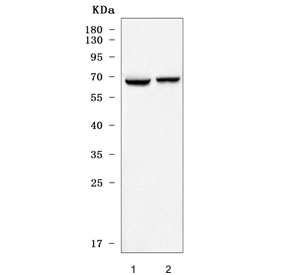- Tel: 858.663.9055
 Email: info@nsjbio.com
Email: info@nsjbio.com
- Tel: 858.663.9055
- Email: info@nsjbio.com
GPCR Antibodies target G protein–coupled receptors (GPCRs), the largest and most diverse family of membrane receptors in the human genome. GPCRs transduce extracellular signals—such as hormones, neurotransmitters, and sensory stimuli—into intracellular responses by coupling to heterotrimeric G proteins. These receptors regulate virtually every physiological process, including vision, taste, smell, cardiovascular regulation, immune function, and neurotransmission.
Because GPCRs are involved in so many critical pathways, they represent the target of more than one-third of all approved drugs. Dysregulation of GPCR signaling contributes to cardiovascular disease, neurological disorders, cancer, inflammation, and metabolic syndromes. The GPCR Antibodies portfolio provides researchers with essential tools for detecting, localizing, and quantifying GPCRs in tissues, cells, and model systems.
NSJ Bioreagents offers GPCR Antibodies validated for immunohistochemistry, immunofluorescence, western blotting, flow cytometry, and ELISA. Each antibody undergoes rigorous testing for specificity and sensitivity, minimizing cross-reactivity with non-target receptors.
By selecting GPCR Antibodies from NSJ Bioreagents, scientists gain reagents optimized for reproducibility across diverse applications. Our antibodies provide clear membrane staining, consistent detection in lysates, and reliable results in functional studies. Detailed datasheets, recommended controls, and validated protocols further ensure that GPCR Antibodies deliver accurate and reproducible results.
The GPCR Antibodies portfolio supports wide-ranging research across biology, pharmacology, and translational medicine.
GPCR Antibodies identify neurotransmitter receptors such as dopamine, serotonin, and adrenergic receptors.
These antibodies support studies of synaptic signaling, behavior, and neurological disorders.
GPCR Antibodies contribute to drug discovery targeting psychiatric and neurodegenerative diseases.
GPCR Antibodies detect adrenergic, angiotensin, and chemokine receptors in vascular biology.
These antibodies clarify signaling pathways involved in blood pressure, heart rate, and metabolism.
GPCR Antibodies are applied in translational research on hypertension, diabetes, and obesity.
GPCR Antibodies reveal receptor expression patterns linked to cancer progression.
These antibodies support biomarker discovery and therapeutic targeting of GPCRs in tumors.
GPCR Antibodies help explore how GPCR signaling contributes to metastasis and angiogenesis.
GPCR Antibodies detect chemokine receptors on leukocytes, essential for immune trafficking.
These antibodies support studies of autoimmune diseases and chronic inflammation.
GPCR Antibodies provide biomarkers for monitoring immunotherapy response.
GPCR Antibodies target olfactory and visual receptors, supporting sensory biology research.
These reagents help clarify mechanisms of perception and sensory disorders.
GPCR Antibodies validate receptor expression in preclinical drug studies.
These antibodies support high-throughput screening platforms.
GPCR Antibodies are used to confirm therapeutic target engagement in clinical trials.
GPCRs are fundamental regulators of physiology and remain the most druggable class of receptors. The GPCR Antibodies portfolio provides researchers with precise tools to study these proteins in health and disease.
In basic science, GPCR Antibodies clarify receptor expression, localization, and signaling. In pharmacology, they support drug development and therapeutic testing. In oncology and immunology, GPCR Antibodies highlight receptor dysregulation and validate biomarkers.
Clinically, GPCR markers are increasingly applied in diagnostics and therapeutic development. By ensuring specificity and reproducibility, GPCR Antibodies bridge discovery biology with translational and clinical research.
G protein–coupled receptors are central to human physiology and drug discovery. The GPCR Antibodies portfolio equips scientists and clinicians with reliable tools for studying GPCR signaling across neuroscience, oncology, immunology, and pharmacology. By supporting reproducibility and clinical relevance, these antibodies remain indispensable for advancing both biomedical discovery and therapeutic innovation.

Western blot testing of mouse 1) testis and 2) brain tissue lysate with GPR50 antibody. Predicted molecular weight ~67 kDa.